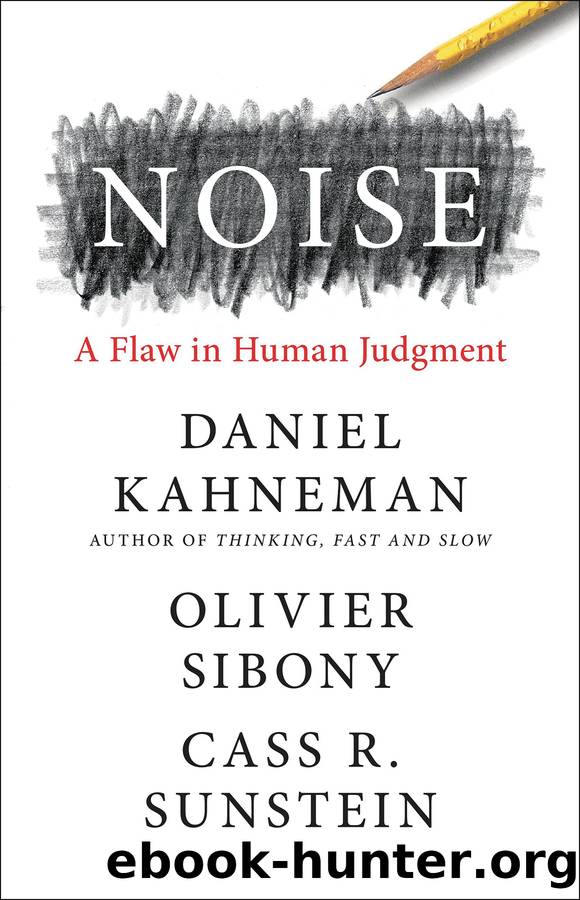Noise: A Flaw in Human Judgment by Sunstein Cass R. & Sibony Olivier & Kahneman Daniel

Author:Sunstein, Cass R. & Sibony, Olivier & Kahneman, Daniel [Sunstein, Cass R.]
Language: eng
Format: epub
Publisher: Little, Brown and Company
Published: 2021-05-18T05:00:00+00:00
Cognitive Style
Regardless of mental ability, people differ in their cognitive style, or their approach to judgment tasks. Many instruments have been developed to capture cognitive styles. Most of these measures correlate with GMA (and with one another), but they measure different things.
One such measure is the cognitive reflection test (CRT), made famous by the now-ubiquitous question about the ball and the bat: âA bat and a ball cost $1.10 in total. The bat costs $1.00 more than the ball. How much does the ball cost?â Other questions that have been proposed to measure cognitive reflection include this one: âIf youâre running a race and you pass the person in second place, what place are you in?â CRT questions attempt to measure how likely people are to override the first (and wrong) answer that comes to mind (âten centsâ for the ball-and-bat question, and âfirstâ for the race example). Lower CRT scores are associated with many real-world judgments and beliefs, including belief in ghosts, astrology, and extrasensory perception. The scores predict whether people will fall for blatantly inaccurate âfake news.â They are even associated with how much people will use their smartphones.
The CRT is seen by many as one instrument to measure a broader concept: the propensity to use reflective versus impulsive thought processes. Simply put, some people like to engage in careful thought, whereas others, faced with the same problem, tend to trust their first impulses. In our terminology, the CRT can be seen as a measure of peopleâs propensity to rely on slow, System 2 thinking rather than on fast, System 1 thinking.
Other self-assessments have been developed to measure this propensity (and all these tests are, of course, intercorrelated). The need-for-cognition scale, for instance, asks people how much they like to think hard about problems. To score high on the scale, you would have to agree that âI tend to set goals that can be accomplished only by expending considerable mental effortâ and disagree with âThinking is not my idea of fun.â People with a high need for cognition tend to be less susceptible to known cognitive biases. Some more bizarre associations have been reported, too: if you avoid movie reviews with a spoiler alert, you probably have a high need for cognition; those who are low on the need-for-cognition scale prefer spoiled stories.
Because that scale is a self-assessment and because the socially desirable answer is fairly obvious, the scale raises fair questions. Someone who is trying to impress is hardly likely to endorse the statement âThinking is not my idea of fun.â For that reason, other tests try to measure skills instead of using self-descriptions.
One example is the Adult Decision Making Competence scale, which measures how prone people are to make typical errors in judgment like overconfidence or inconsistency in risk perceptions. Another is the Halpern Critical Thinking Assessment, which focuses on critical thinking skills, including both a disposition toward rational thinking and a set of learnable skills. Taking this assessment, you would be asked questions like this: âImagine that a friend asks you for advice about which of two weight-loss programs to choose.
Download
This site does not store any files on its server. We only index and link to content provided by other sites. Please contact the content providers to delete copyright contents if any and email us, we'll remove relevant links or contents immediately.
| Administration & Medicine Economics | Allied Health Professions |
| Basic Sciences | Dentistry |
| History | Medical Informatics |
| Medicine | Nursing |
| Pharmacology | Psychology |
| Research | Veterinary Medicine |
Bioenergetica by Alexander Lowen(1122)
Noise: A Flaw in Human Judgment by Sunstein Cass R. & Sibony Olivier & Kahneman Daniel(967)
The Data Detective by Tim Harford(938)
The Child in You by Stefanie Stahl(882)
Chatter by Ethan Kross(796)
The Science of Rapid Skill Acquisition by Peter Hollins(635)
Freedom by Sebastian Junger(629)
No Bad Parts by Richard C. Schwartz(599)
The Montessori Baby by Simone Davies(560)
Evolution Gone Wrong: The Curious Reasons Why Our Bodies Work by Alex Bezzerides(558)
The Quantum Psychiatrist: From Zero to Zen Using Evidence-Based Solutions Beyond Medication and Therapy by Biswas Dona(551)
Maps of Meaning: The Architecture of Belief by Jordan B. Peterson(548)
The Science of Self-Learning: How to Teach Yourself Anything, Learn More in Less Time, and Direct Your Own Education (Learning how to Learn Book 1) by Peter Hollins(518)
Anxiety For Dummies by Charles H. Elliott & Laura L. Smith(511)
Sadomasochism and the BDSM Community in the United States by Stephen K. Stein(497)
Disconnected by thomas Kersting(480)
Why Sex Doesn't Matter by Olivia Fane(479)
The Mechanics of Passions: Brain, Behaviour, and Society by Alain Ehrenberg(478)
Jung - The Key Ideas: Teach Yourself (TY Philosophy) by Ruth Snowden(465)
